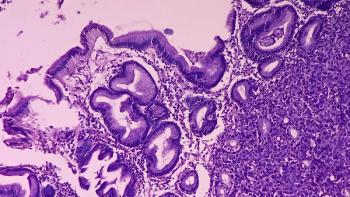
An expert discussed how oncology nurses can help social workers seek available financial resources for patients by opening the conversation about any needs to be addressed.

An expert discussed how oncology nurses can help social workers seek available financial resources for patients by opening the conversation about any needs to be addressed.

Speaking with patients with cancer about financial toxicity, including available resources to help them pay for treatment and other necessities, can become a collaborative effort within an institution.

Trastuzumab deruxtecan showed the longest time to next treatment in patients with HER2-positive breast cancer or with stable HER2-low disease among the primary and metastatic setting.

Olaparib did not significantly improve overall survival compared with chemotherapy in recurrent, platinum-sensitive ovarian cancer.

The median progression-free survival with cabozantinib was 8.3 months vs 3.2 months with placebo among patients with extra-pancreatic neuroendocrine tumors.

Kim Noonan, DNP, ANP-BC, AOCN, FAAN, discusses how nurses can help patients with myeloproliferative neoplasms prevent cardiovascular and thrombotic events.

Patients with early breast cancer may safely choose a shorter course of radiation therapy following reconstruction.

Ryan Tamargo, NP, AONCP, discusses the launch of an online inflammatory breast cancer scoring system tool.

Ryan Tamargo, NP, AONCP, highlights how a new diagnostic tool can help improve accurate inflammatory breast cancer diagnoses.

Patients with heavily pretreated relapsed/refractory multiple myeloma, including those with lenalidomide and pomalidomide-refractory disease, showed encouraging responses with mezigdomide plus dexamethasone.

Patients with advanced urothelial carcinoma who received avelumab reported any-grade treatment-related adverse events at a rate of 78.2%.

The rates of treatment discontinuation were higher with enzalutamide and apalutamide than with darolutamide for patients with non-metastatic castration resistant prostate cancer.

The median progression-free survival with atezolizumab to cabozantinib was 10.6 vs 10.8 months with cabozantinib alone.

Sacituzumab govitecan improved overall survival vs treatment of physician’s choice in pretreated, endocrine-resistant, hormone receptor–positive, HER2-negative metastatic breast cancer.

Patients with depression had a 37% higher risk of dying from their disease than patients without a mental health diagnosis.

Applying weighted blankets for 20 minutes reduced patient anxiety during cancer infusions.

A telephone-based weight loss program proved to be efficacious in overweight or obese women with breast cancer and may lead to improved disease outcomes in the long run.

Oncology nurse investigators from Dana-Farber discuss the value of weighted blankets in reducing patient anxiety during infusions.

Specialists highlight the best practices and latest treatment regimens for patients presenting with myelofibrosis, polycythemia vera, and essential thrombocythemia.

Applying the local anesthetic lidocaine preceding surgery yielded significant survival benefits for patients with early-stage breast cancer.

Investigators continue to explore new ways to manage colorectal cancer with a BRAF V600E mutation.

This and previous research from the Sethi Lab suggest Sox9 is a promising therapeutic target for colorectal cancer.

There continues to be an unmet need for effective and tolerable frontline treatments for patients with squamous cell carcinoma of the head and neck, according to investigators.

Findings showed that Black patients were 4.3 percentage points less likely to receive any opioid and 3.1 percentage points less likely to receive long-acting opioids near end-of-life compared with White patients.

Findings from the POSITIVE trial suggest that pausing endocrine therapy to pursue pregnancy did not negatively affect outcomes for patients with breast cancer.

Narjust Florez, MD, emphasizes why oncology health care professionals should bring a sense of urgency to ensuring that clinical trials represent all patient populations.

Dana-Farber Cancer Institute, one of the world’s leading cancer research and treatment centers, has partnered with the Parker Institute for Cancer Immunotherapy, the leading network of immuno-oncology expertise in the world, as a member of the PICI Network with a goal to better understand the tumor microenvironment across cancer types and translate these basic discoveries to the clinic as impactful cancer immunotherapies.

A combination of the aromatase inhibitor letrozole and the CDK4/6 inhibitor abemaciclib may help patients with recurrent estrogen receptor–positive endometrial cancer achieve responses.

Innovative strategies are needed to ensure that adolescents and young adults with cancer who prefer to die at home are able to make that choice.

Findings from the SHAWL study found that sexual dysfunction rates are high among women with lung cancer.